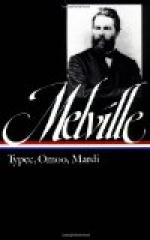CHAPTER XXXI Babbalanja Discourses In The Dark
Next day came and went; and still we onward sailed. At last, by night, there fell a calm, becalming the water of the wide lagoon, and becalming all the clouds in heaven, wailing the constellations. But though our sails were useless, our paddlers plied their broad stout blades. Thus sweeping by a rent and hoar old rock, Vee-Vee, impatient of the calm, sprang to his crow’s nest in the shark’s mouth, and seizing his conch, sounded a blast which ran in and out among the hollows, reverberating with the echoes.
Be sure, it was startling. But more so with respect to one of our paddlers, upon whose shoulders, elevated Vee-Vee, his balance lost, all at once came down by the run. But the heedless little bugler himself was most injured by the fall; his arm nearly being broken.
Some remedies applied, and the company grown composed, Babbalanja thus:—“My lord Media, was there any human necessity for that accident?”
“None that I know, or care to tell, Babbalanja.”
“Vee-Vee,” said Babbalanja, “did you fall on purpose?”
“Not I,” sobbed little Vee-Vee, slinging his ailing arm in its mate.
“Woe! woe to us all, then,” cried Babbalanja; “for what direful events may be in store for us which we can not avoid.”
“How now, mortal?” cried Media; “what now?”
“My lord, think of it. Minus human inducement from without, and minus volition from within, Vee-Vee has met with an accident, which has almost maimed him for life. Is it not terrifying to think of? Are not all mortals exposed to similar, nay, worse calamities, ineffably unavoidable? Woe, woe, I say, to us Mardians! Here, take my last breath; let me give up this beggarly ghost!”
“Nay,” said Media; “pause, Babbalanja. Turn it not adrift prematurely. Let it house till midnight; the proper time for you mortals to dissolve. But, philosopher, if you harp upon Vee-Vee’s mishap, know that it was owing to nothing but his carelessness.”
“And what was that owing to, my lord?”
“To Vee-Vee himself.”
“Then, my lord, what brought such a careless being into Mardi?”
“A long course of generations. He’s some one’s great-great-grandson, doubtless; who was great-great-grandson to some one else; who also had grandsires.”
“Many thanks then to your highness; for you establish the doctrine of Philosophical Necessity.”
“No. I establish nothing; I but answer your questions.”
“All one, my lord: you are a Necessitarian; in other words, you hold that every thing takes place through absolute necessity.”
“Do you take me, then, for a fool, and a Fatalist? Pardie! a bad creed for a monarch, the distributor of rewards and punishments.”
“Right there, my lord. But, for all that, your highness is a Necessitarian, yet no Fatalist. Confound not the distinct. Fatalism presumes express and irrevocable edicts of heaven concerning particular events. Whereas, Necessity holds that all events are naturally linked, and inevitably follow each other, without providential interposition, though by the eternal letting of Providence.”




